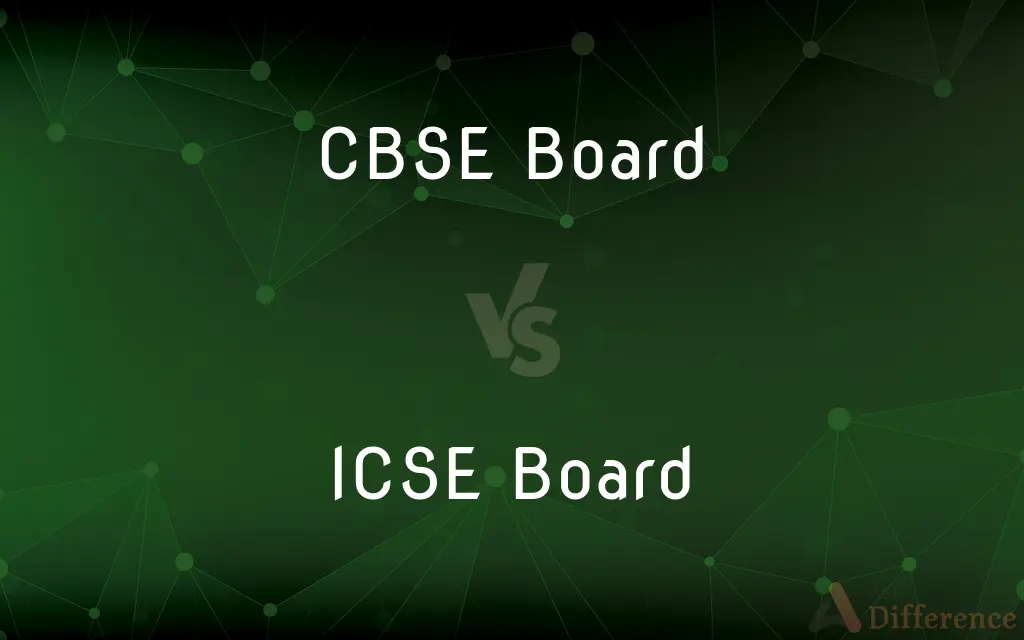CBSE Board vs. ICSE Board — What's the Difference?
By Tayyaba Rehman — Published on December 29, 2023
CBSE Board follows a centralized curriculum; ICSE Board offers a more comprehensive and detailed curriculum.

Difference Between CBSE Board and ICSE Board
Table of Contents
ADVERTISEMENT
Key Differences
The CBSE Board, or Central Board of Secondary Education, is a national education board in India with a uniform curriculum across its affiliated schools. On the other hand, the ICSE Board, known as the Indian Certificate of Secondary Education, follows a more detailed and comprehensive curriculum tailored for individual schools.
CBSE Board's approach focuses on mathematics and science, emphasizing preparing students for competitive examinations in India. In contrast, ICSE Board offers a balanced approach, with equal importance to arts, languages, and science, making it more holistic.
When it comes to assessment, CBSE Board largely uses summative assessment methods to evaluate student learning at the end of an instructional period. The ICSE Board, however, combines formative and summative assessments, giving continuous feedback and comprehensive evaluations.
The CBSE Board is recognized and affiliated with many schools across India and even internationally, making it more accessible for students seeking a standardized curriculum. Meanwhile, ICSE Board is known for its rigor and is sometimes perceived as more challenging, but it's recognized for its international equivalency standards.
Lastly, while CBSE Board focuses on rote learning to some extent, aiming to help students crack national entrance exams, ICSE Board emphasizes critical thinking, analytical skills, and a deeper understanding of subjects, aiming to create a well-rounded educational experience.
ADVERTISEMENT
Comparison Chart
Curriculum Focus
Centralized, nationally uniform
Detailed, comprehensive, tailored for schools
Subject Emphasis
Focus on mathematics and science
Balanced approach: arts, languages, and science
Assessment Method
Mostly summative assessments
Combination of formative and summative assessments
Recognition
National and some international affiliations
Recognized for international equivalency standards
Learning Approach
Some emphasis on rote learning
Emphasizes critical thinking and deeper understanding
Compare with Definitions
CBSE Board
A national education board in India with a centralized curriculum.
The CBSE Board conducts the Class 10 and 12 examinations annually.
ICSE Board
An Indian educational board known for its detailed curriculum.
The ICSE Board's Class 10 exams are known for their comprehensive questioning.
CBSE Board
Prioritizes preparation for national competitive exams.
Many coaching institutions use the CBSE Board syllabus to prepare students for various entrance tests.
ICSE Board
Combines formative and summative assessment methods.
The ICSE Board believes in continuous evaluation and feedback for student development.
CBSE Board
Recognized for its emphasis on science and mathematics.
If aiming for engineering entrance exams, studying under the CBSE Board might be beneficial.
ICSE Board
Recognized for international equivalency standards.
ICSE Board certifications are often accepted in universities abroad due to their rigorous standards.
CBSE Board
Affiliated with numerous schools across India and abroad.
The CBSE Board's wide recognition makes it easier for students to transfer schools.
ICSE Board
Emphasizes analytical skills and critical thinking.
The ICSE Board curriculum encourages students to analyze, question, and understand subjects deeply.
CBSE Board
Utilizes mostly summative assessment methods.
The CBSE Board's exam pattern focuses on evaluating content knowledge at the end of the academic year.
ICSE Board
Offers a balanced curriculum with arts, languages, and science.
Students under the ICSE Board have a well-rounded educational foundation.
Common Curiosities
What is the CBSE Board known for?
The CBSE Board is known for its centralized, nationally uniform curriculum.
How does the ICSE Board's curriculum differ from CBSE?
The ICSE Board offers a detailed, comprehensive curriculum with a balanced approach to arts, languages, and science.
Which board is perceived as more challenging?
The ICSE Board is often perceived as more rigorous and challenging.
Is the CBSE Board recognized internationally?
Yes, CBSE Board is affiliated with some schools internationally.
Do both boards prepare students for competitive exams?
While both boards offer preparation, the CBSE Board is more tailored for national competitive exams.
How does the ICSE Board assess students?
The ICSE Board uses a combination of formative and summative assessments.
Which board has a more standardized curriculum across schools?
The CBSE Board has a more standardized, uniform curriculum across its affiliated schools.
Do universities abroad recognize the ICSE Board?
Yes, many universities abroad recognize and accept the ICSE Board due to its rigorous standards.
Which board emphasizes more on science and math?
The CBSE Board places a stronger emphasis on mathematics and science.
How widespread is the CBSE Board's recognition in India?
The CBSE Board is widely recognized, with numerous schools affiliated across India.
Is the ICSE Board curriculum recognized abroad?
Yes, the ICSE Board is recognized for its international equivalency standards.
Which board emphasizes critical thinking?
The ICSE Board emphasizes critical thinking, analytical skills, and deep understanding.
How are arts and languages treated in the ICSE Board?
The ICSE Board offers significant importance to arts and languages, ensuring a holistic education.
Between CBSE and ICSE, which board is more adaptable for students shifting schools?
The CBSE Board, with its national and some international affiliations, might be more adaptable for such students.
Which board focuses more on rote learning?
The CBSE Board has some emphasis on rote learning.
Share Your Discovery

Previous Comparison
Short Ribs vs. Spare Ribs
Next Comparison
Dugongs vs. ManateesAuthor Spotlight
Written by
Tayyaba RehmanTayyaba Rehman is a distinguished writer, currently serving as a primary contributor to askdifference.com. As a researcher in semantics and etymology, Tayyaba's passion for the complexity of languages and their distinctions has found a perfect home on the platform. Tayyaba delves into the intricacies of language, distinguishing between commonly confused words and phrases, thereby providing clarity for readers worldwide.












































